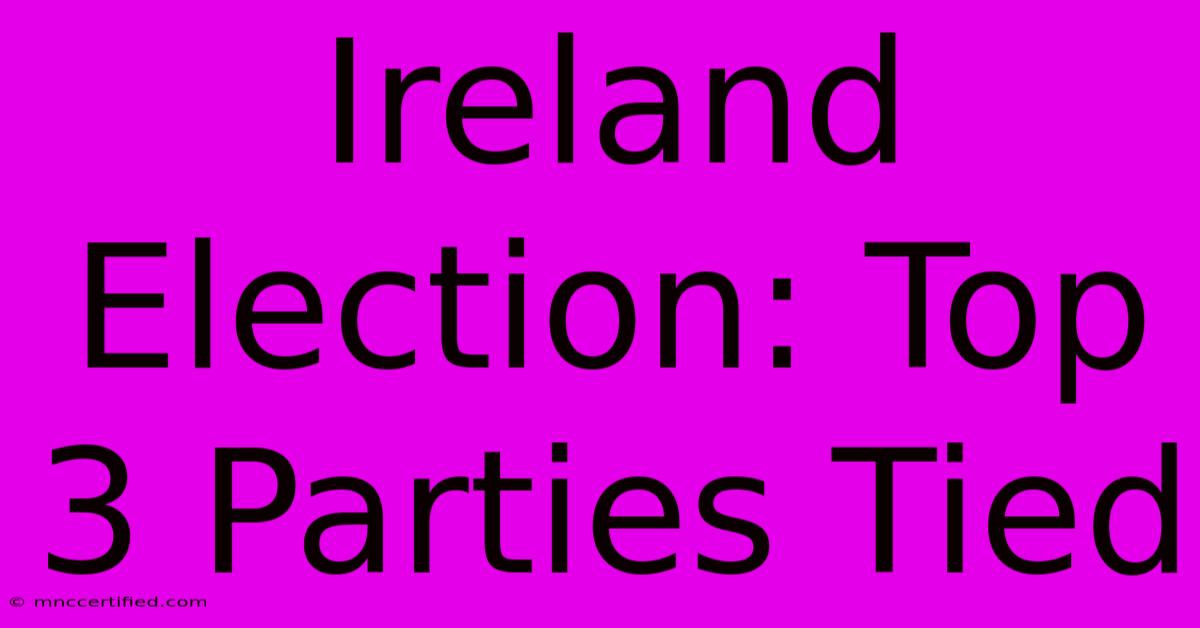Ireland Election: Top 3 Parties Tied

Table of Contents
Ireland Election: Top 3 Parties Tied – A Nation Divided?
Ireland's recent general election has delivered a surprising and unprecedented result: a three-way tie between the leading parties. This outcome leaves the country facing a period of intense political negotiation and uncertainty, with significant implications for the nation's future direction. This article will delve into the key factors contributing to this deadlock, analyze the potential coalitions, and explore the challenges ahead for the next Irish government.
The Deadlock: A Trio of Power
The election saw a near-identical performance from Fianna Fáil, Fine Gael, and Sinn Féin, leaving all three parties scrambling for potential coalition partners. This unprecedented three-way tie highlights a significant shift in Irish politics, reflecting a growing fragmentation of the electorate and a desire for change. The traditional dominance of the two larger parties, Fianna Fáil and Fine Gael, has been definitively challenged by the rise of Sinn Féin.
Sinn Féin's Surge: A New Era?
Sinn Féin's strong performance marks a pivotal moment. Their success is largely attributed to their strong social welfare policies, particularly their focus on affordable housing and addressing the cost of living crisis. This resonates deeply with younger voters and those struggling financially. However, their historical links to the Provisional IRA remain a significant hurdle for many potential coalition partners.
Fianna Fáil and Fine Gael: A Decline in Influence?
Both Fianna Fáil and Fine Gael, long-standing pillars of Irish politics, experienced a decline in their vote share. This suggests a growing disillusionment with established parties and a desire for a more radical approach to governance. Their failure to effectively address key issues like housing shortages and healthcare waiting lists likely contributed to their reduced support. They now face the challenge of rebuilding their image and regaining public trust.
The Path to Coalition: Navigating Complex Alliances
Forming a stable government will require delicate negotiations and compromises. Several potential coalition scenarios exist, each presenting unique challenges:
- A Fianna Fáil-Fine Gael Coalition: This would be a continuation of the traditional power structure, but may lack the mandate for significant change. Public appetite for another iteration of this partnership might be limited given the current climate.
- A Sinn Féin-led Coalition: This option presents the most significant shift. While Sinn Féin secured the most seats, forging a stable majority would require alliances with smaller parties, necessitating considerable compromise on their policy platform. Concerns about Sinn Féin's past remain a major obstacle.
- A Minority Government: This is a real possibility given the fragmented nature of the election results. A minority government would require significant cross-party cooperation, leading to potential instability.
The Challenges Ahead: Housing, Healthcare, and the Economy
Regardless of the coalition formed, the next Irish government will face significant challenges:
- Housing Crisis: Addressing the ongoing housing shortage is a paramount concern. The need for increased social housing, affordable rental options, and stricter regulation of the private rental sector is critical.
- Healthcare System: Long waiting lists and understaffing plague Ireland's healthcare system. Increased investment and reform are urgently needed.
- Economic Uncertainty: Global economic headwinds pose a significant challenge, demanding careful fiscal management and strategic planning.
Conclusion: A Nation at a Crossroads
The Irish election has left the nation at a crossroads. The three-way tie signifies a profound shift in Irish politics, reflecting evolving public priorities and a growing dissatisfaction with established parties. The formation of a stable and effective government will demand skillful negotiation and a willingness to compromise. The success of the next government will hinge on its ability to effectively address the nation's most pressing challenges, particularly in the areas of housing, healthcare, and economic stability. The coming weeks and months will be crucial in determining the future direction of Ireland.

Thank you for visiting our website wich cover about Ireland Election: Top 3 Parties Tied. We hope the information provided has been useful to you. Feel free to contact us if you have any questions or need further assistance. See you next time and dont miss to bookmark.
Featured Posts
-
My 86k Stock Market Plan
Nov 30, 2024
-
Jihadists Near Aleppo Deadly Advance
Nov 30, 2024
-
Black Friday Conservative Sales
Nov 30, 2024
-
Best Ps 5 Deals This Black Friday
Nov 30, 2024
-
Brothers Bond Bourbon Signed
Nov 30, 2024